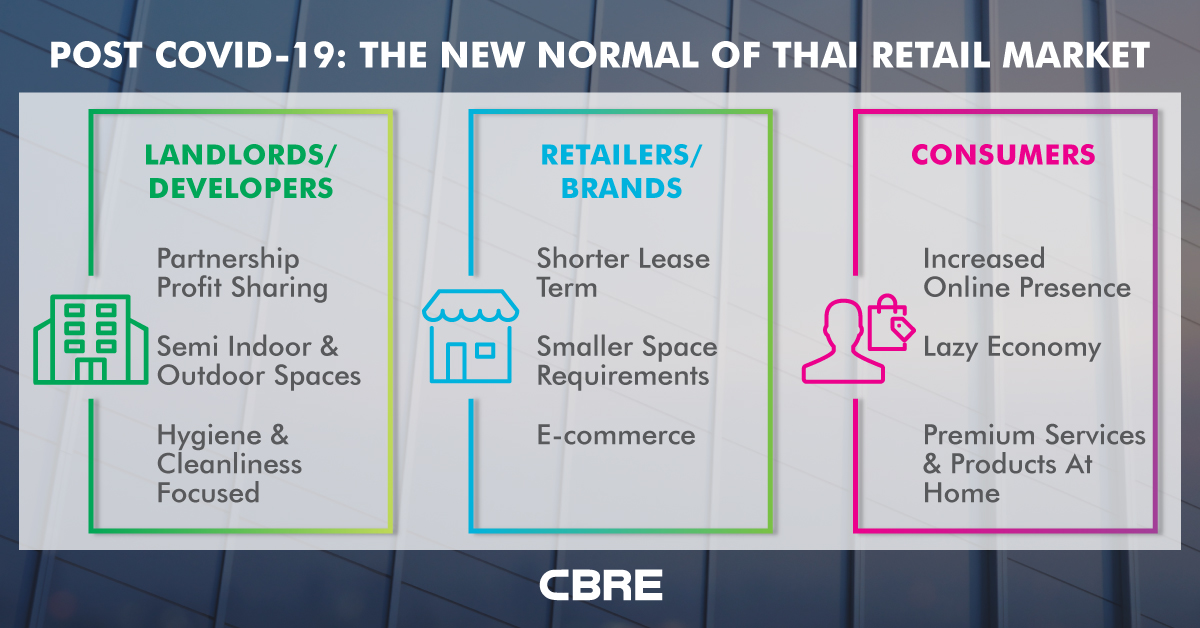First to watch is the relationship between retail landlords and tenants. “Retail landlords and tenants’ co-operation will become more crucial than ever before. Both sides will now consider more realistic rents and flexible leasing terms and conditions depending on retail business and sizes. Partnership Rents and Percentage Revenue Sharing are preferred options of these co-operation rather than Fixed Rent. Even though this will make the retail market more sophisticated, it is the most realistic approach going forward in the new normal era,” commented Ms. Jariya Thumtrongkitkul, Head of Advisory and Transaction Services – Retail, CBRE Thailand.
In the old days, most retail tenants and landlords were familiar with the fixed rental fee, where tenants did not disclose their transactions and monthly revenues to the landlords and the landlords could easily predict their monthly revenue for the whole retail project. But the sudden arrival of the global virus outbreak has reconfirmed the drawbacks of this traditional option to the tenants especially when there is uncertainty of business based on the uncontrollable circumstances.
For developers, changes in the use of retail space are also in the works to restore customers’ confidence on safety, engagement and appetite. As Social Distancing becomes the new normal, shopping centres will likely to provide more semi indoor- outdoor areas where customers can enjoy fresh air, various temporary spaces for pop-up stores or unique retail formats and additional recreation areas like green space, outdoor seating, pet-friendly area, auditorium space, rooftop space and jogging lanes. These new landmark and other signature areas of the shopping malls will flourish as additional points to boost customers’ engagement and confidence in safety, and create positive and unique shopping experiences in those malls. CBRE believes hygiene and cleanliness will also be one of the retail design principles and touchless technologies which reduce direct surface contact such as automatic toilets, entrance door sensors, and automated parking will be heavily introduced as a result of social distancing.
On the retailers’ side, while some brands might be forced to permanently shut down their unprofitable branches, others will become more selective in choosing a suitable location and rental price. Shorter lease terms and less security deposit are expected for more liquidity. More importantly, businesses are strategically adjusting their operating space as less service area is required on the storefront.
Ms. Jariya also stated, “we are seeing retailers, especially F&B, fashion, cosmetics and personal care businesses shifting their focus heavily towards the e-commerce territory. The fastest adapters like the fast-food chains will downsize their seating areas to have bigger operating kitchen and delivery pick-up areas. A big casual dining restaurant, for example, will now scale down their space. Retailers' rental space requirement may be reduced by 20%-40% from its original size from the pre-COVID-19 pandemic.”
As health and wellness concerns drive more consumers to seek indulgences online during social distancing, retailers will pour the money generated from operating expense cuts; from size reduction, rental price and construction for each branch; into expanding an always-on presence to equip their business in the cut-throat competition of digital platforms. Enhancing online users’ positive experiences will become their main digital strategy.
“Consumers should now brace themselves for a new breed of retail businesses that are already thriving off the Lazy Economy consumer pattern occurring in major cities around the world,“ added Ms. Jariya.
With online shopping, at-home-fitness classes, and home cinema apps like Netflix to ready-to-eat food deliveries, people will fill their households with comfort products and wellness-maintenance upgrades such as lounging furniture, gym equipment and electronics for remote working which is becoming the most widespread working trend nowadays. Therefore, both retail landlords and tenants must strive to create 'positive shopping experience’ for these health-conscious and convenience-centric consumers.
In the long run, CBRE believes that, in the new normal era, the Thai retail market will inevitably undergo major readjustment of retail space for wellness purposes and relationships among all the market’s stakeholders as well. From the times of economic downturns, political unrest, the rise of digital platform to the environmental crisis, keeping ahead of the consumer behaviour trends is vital not only for the industry’s growth, but also for its survival.
